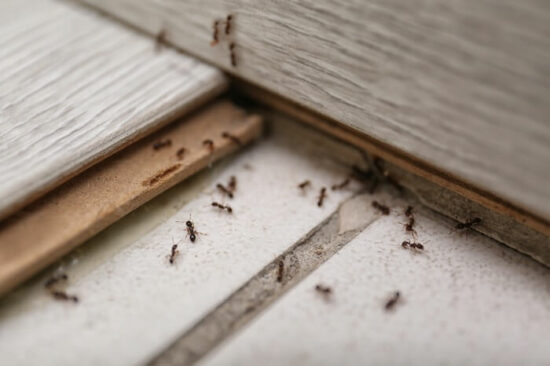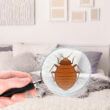Finding ants in your bedroom is never fun. After all, this is supposed to be your place of peace!
But it happens.
This guide will teach you how to get rid of ants in your bedroom, and prevent them from coming back again in the future.
Let’s get started!
Table of contents
Why Are There Ants In My Bedroom?
Ants are something we expect to find outside or in the kitchen. But when you suddenly find ants in your bedroom, it’s a pretty big cause of concern!
Bedrooms are seemingly devoid of all the things ants need to survive. So, why are you suddenly getting unwanted visitors?
Chances are, your bedroom supports the life of these pests better than you think! Ants are in a constant search for food, moisture, and protection. Most rooms in your home fit the bill for shelter.
- Kills common household ants including acrobat, crazy, ghost, little black, odorous house, pavement, and other sweet-eating ants
- As worker ants discover the bait, they share it with the rest of the colony to eliminate them all
- You should see a significant decrease in the number of ants visiting the bait stations within just a few days
- Place stations near areas where you’ve seen ant activity
Food and moisture, on the other hand, are a bit more limited. Ants need a constant supply of sustenance to live, so they typically gravitate towards rooms that offer those. The go-to spot in most cases is the kitchen and bathroom.
Take a moment to think about how you use your room. Do you like to snack and watch movies on the bed? What about eating a quick lunch while working on your laptop. Do you leave dirty dishes on the bedside table?
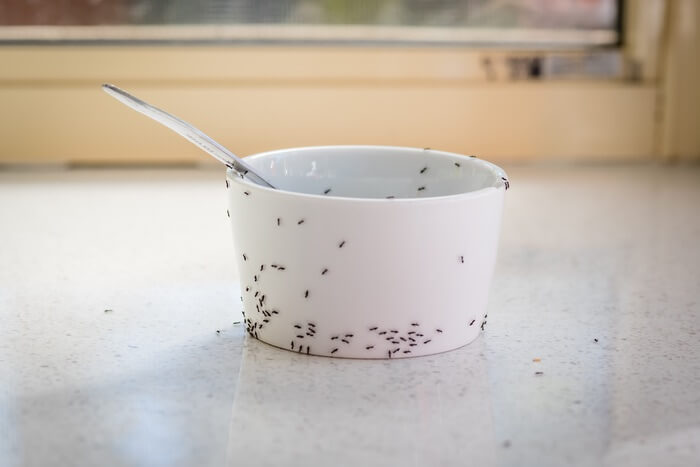
If you bring food and drinks into your room regularly, there’s a good chance that area is ripe with food sources. Ants don’t need fresh food. Crumbs and scraps do just fine!
All those little crumbs you brush off your bed onto the carpet floor can fully support ants. While you have a kitchen with much more opportunities to feed, your room may be just as appealing.
Bedrooms also tend to be smaller, warmer, and more densely packed with furniture. Not only does it give ants more places to live, but it increases the chances that they will go undetected. Pair that with all the food remnants, and they don’t have to go far to support a growing colony.
Suddenly, it’s not hard to see why ants might show up in your bedroom!
Types Of Ants That Are Usually Found In Bedrooms
Did you know that there are thousands of different ant species in the world? Don’t worry! The number of species you have to worry about invading your home is limited to about 25, and the species that will venture into your bedroom is even smaller.
Most ants prefer to build colonies outside where they’re not confined. However, a handful will seize the opportunity to enter your bedroom when they find it.
One of the most common pest ants you’ll find in bedrooms is the black ant. It’s sometimes referred to as the little black ant or the black garden ant. Whatever you call it, these buggers (see what we did there) can be a downright pain.
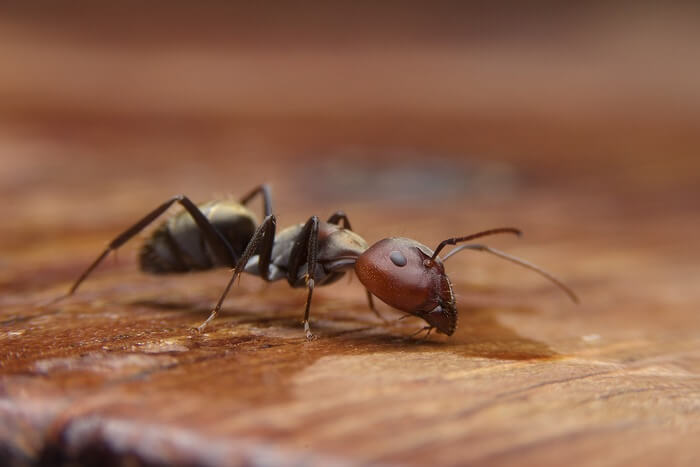
They like to build nests in walls and rotting floorboards. Because they’re so small, black ants can get just about anywhere.
Next, there’s the pharaoh ant. This species is usually light brown and has a small dot of black on its abdomen. They’re a prevalent “indoor” variant that likes to live in furniture, under floors, in walls, and pretty much anywhere else they can get.
These ants almost always seek indoor living because of their penchant for warm and humid environments.
A couple of smaller ant species can enter bedrooms, too. You might see ghost ants, acrobat ants, or odorous ants. All of these varieties seek out small, discrete areas to live. Examples include cracks, wall voids, and floorboards.
Ghost ants have a distinct white abdomen and white legs. The head and upper body, however, are black. Acrobat ants and odorous ants are both small and black. However, the latter emits a pungent aroma when crushed.
Finally, we have the dreaded carpenter ant. Carpenter ants are some of the most frustrating to tackle. They bore through wood in search of moisture and food.
Quick Tip: Contrary to popular belief, they don’t actually eat the wood. Instead, they’re master excavators that will quickly ruin wall studs, subfloors, rafter, and any other wood source they access.
Where Do They Come From?
Ants don’t just magically show up. They have to originate from somewhere. In all likelihood, the pests invaded other parts of your home before entering your bedroom. That means that you might be dealing with a more extensive infestation.
As mentioned earlier, ants are always looking for food and water. Many species have dedicated scouts that venture far from the colony to find a new home. If you ever see a lone ant, it’s probably the scout on a mission!
- Kills common household ants including acrobat, crazy, ghost, little black, odorous house, pavement, and other sweet-eating ants
- As worker ants discover the bait, they share it with the rest of the colony to eliminate them all
- You should see a significant decrease in the number of ants visiting the bait stations within just a few days
- Place stations near areas where you’ve seen ant activity
Colonies will send out scouts to get away from harsh environmental conditions, too. Heavy rains, soil erosion, and a complete lack of food in the area will drive ants to find a new place to establish the colony.
Scouts typically enter a home through pretty basic means: Through a door or open window. Some may find a crack in the foundation or a small void around the door frame. Either way, that open path is instantly marked for others.
Quick Tip: Scouts leave behind a scent trail to guide other ants to the new home. Some even follow the scent of an entirely different colony or species!
The point is that it doesn’t take much to attract ants. These pests usually find what they’re looking for in the kitchen and dining room.
Even after they start flourishing in their new home, ants will continue to look for better conditions. They’ll venture out to other rooms in search of someplace safer. That’s where your bedroom comes in!
You see, ants don’t target bedrooms. Most inadvertently end up there after living in other places. If you see a colony in your room, there are probably even more ants elsewhere!
Places To Check For Ants In Your Bedroom
Ants are surprisingly selective when finding a place to live. New shelters must meet specific criteria. Don’t expect to find the population living out in the open. You might see a few scouts and workers, but the brunt of the colony will reside in the shadows.
So, where can you find these bugs hiding? Here are some spots in your bedroom to examine.
Cracks & Openings
If you suspect an ant problem in your bedroom, search it for any structural issues. Cracks and holes are some of the best places for ants to live. Not only is it dark and hidden, but those voids are out of the way. As a result, you’re much less likely to encounter them.
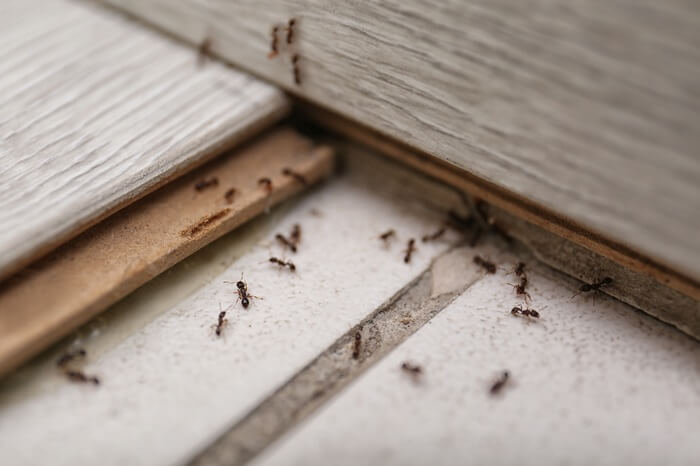
Look around every corner of the room. That means checking door frames, windowsills, molding, and any fancy trim. Don’t just limit yourself to walls and vertical spaces!
Quick Tip: Ants can live underneath floorboards, too! While we don’t recommend tearing up your floor on a hunch, it’s important to be aware of this.
Behind Furniture
Don’t forget to take a peek behind furniture.
The issue with bedrooms is that most of us have several big furniture pieces that we only clean around. For example, you might have a large dresser, giant wardrobe unit, some bookshelves, and nightstands. Of course, there’s also the bed.
Because most people don’t move furniture to clean underneath it, those spots tend to accumulate lots of debris that ants might be interested in.
Ants like to live in those dark corners of your room, so roll up your sleeves and start moving furniture!
In Closets
Ants aren’t keen on eating clothes. However, they can still end up in the closet of your bedroom.
This is because closets are a less-frequented part of the room that offers tons of shelter. Plus, many have wooden shelving or rods. Those elements are perfect for wood-loving ants. They can also have voids for smaller species to live in.
Carpet Fibers & Rugs
Have some high-pile floor covers in your bedroom? Vacuum them regularly!
Carpets and rugs regularly accumulate food crumbs and grime. The piles give ants just the right amount of protection while still letting them access the mat below. Having ants in your carpet isn’t fun!
In The Ceiling
Here’s an overlooked area that could easily harbor ants that end up in your bedroom. Ceilings are rife with potential issues. You could experience a leak that creates a valuable source of moisture for the ants.
Quick Tip: Wood damage from rot might create plenty of voids for ants to call home. Carpenter ants are the most likely species to invade the structural components of your ceiling. However, any ant species can move in if the conditions are right.
How To Get Rid Of Ants In Your Bedroom
So you found ants in your bedroom. What now?
While ants don’t present the same health concerns as roaches or other common pests, they can still pose a serious problem! No one wants to deal with tiny critters (and even potential bites) in the middle of the night.
- Kills common household ants including acrobat, crazy, ghost, little black, odorous house, pavement, and other sweet-eating ants
- As worker ants discover the bait, they share it with the rest of the colony to eliminate them all
- You should see a significant decrease in the number of ants visiting the bait stations within just a few days
- Place stations near areas where you’ve seen ant activity
Furthermore, ants can carry bacterial and fungal organisms that cause disease. On top of all that, these pests can trigger allergies.
You should never ignore a potential infestation. Doing so will only let the colony flourish. Before you know it, your ant issue will go beyond the bedroom and require professional care.
Fortunately, there are many ways to get rid of ants in the bedroom and prevent them from coming back!
Clean Everything
Your priority should be to clean every inch of your bedroom. Don’t cut corners here! Ants are clever escape artists that will quickly hide in places you fail to clean.
Move some furniture, take a vacuum to every surface, and scrub your room down! We recommend washing linens as well.
Remove Their Food & Water Sources
Hopefully, cleaning your bedroom removed all of the food sources for the ants. But, what about water? Look around the room for leaks.
Leaks can come from pipes that feed adjacent bathrooms, aquariums, or even spilled drinks. Take time to find those issues and address them. Pay special attention to the ceiling!
Moving forward, it’s essential to change your habits a bit. It’s your choice if you love to snack in your bedroom. While it’s better to leave food out, we understand the allure!
If you do eat and drink in your bedroom, make sure to clean up afterward. Contain the mess to limit anything that could attract ants to your bedroom in the future.
Place Bait Traps
Now, it’s time to kill the ants in your bedroom (and around it). The problem with these pests is that you rarely see the colony. It’s not like an anthile in the ground outside. They stay hidden, making it difficult to eliminate the colony in one go.
The most effective way to target the entire population is to use bait traps. These traps include poisoned food. The poison doesn’t kill the ants immediately.
As a result, they bring it back to the colony to spread!
There’s no shortage of commercial traps out there. They’re readily available at most hardware stores, and will do a great job of helping you get rid of ants in your bedroom.
If you prefer a DIY method, you can make your own trap with sugar and borax. Mix the two powdered ingredients and place them in a small dish near the ant trail. Keep it close to where you spotted the ants in your bedroom to ensure that they take the bait.
Quick Tip: Of course, exercise caution here if you have pets or kids. We recommend blocking off the room to prevent accidental ingestion.
Apply Insecticides
Get rid of any visible ants with insecticides that kill on contact. You may want to squish the insects instead. However, insecticides are much more effective and will do a great job of getting rid of ants in your bedroom.
You’re free to use either chemical-based insecticides or natural ones. Like traps, commercial ant killers are a dime a dozen. Most work exceptionally well on contact.
Be careful with the insecticide. Make sure no one is in the room. Also, pop a few windows open and use skin protection to avoid any harm.
Quick Tip: For a more natural approach, try using diatomaceous earth. This powdery substance is made out of the crushed, skeletal remains of algae. It’s sharp and immediately harms the ant’s exoskeleton.
Eventually, the ant dehydrates and dies. The product works on contact, so you can quickly spread it around the room. Let it sit for a few hours before vacuuming it up.
Seal Any Openings
Remember all those access points you found earlier? Seal them up!
Use some caulk to fill any crack or hole you find. Doing so will make the ants’ hiding place inaccessible. Furthermore, it prevents future ants from moving into your bedroom.
Remove Scents
There’s still more work to be done after you apply insecticides, clean the room, and vacuum up any dead ants. Next up, you need to eliminate the scent trail. Remember, ants can always find their way back because of the scent they leave behind.
Use a vinegar-based solution to mask the trail. Ants hate vinegar. It’s far too strong for their senses, so it’ll cover up any existing scents in the area.
You can dilute the vinegar with some water and add a few drops of essential oil. Citrus-based oils and pungent herbs are best.
Spray the solution along known scent trails. Feel free to apply it in other areas, too. It’s not just a scent coverup. Vinegar and essential oils work wonderfully as all-natural deterrents, too.
Closing Thoughts
Getting rid of ants in your bedroom isn’t as challenging as it seems. As long as you’re thorough and follow the proper steps, you should be able to find success.
If you’ve gone through the steps above and still have ants in your bedroom, we recommend contacting an ant exterminator.
